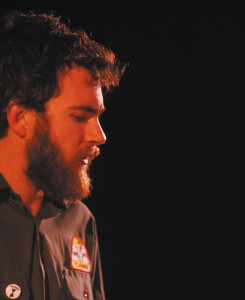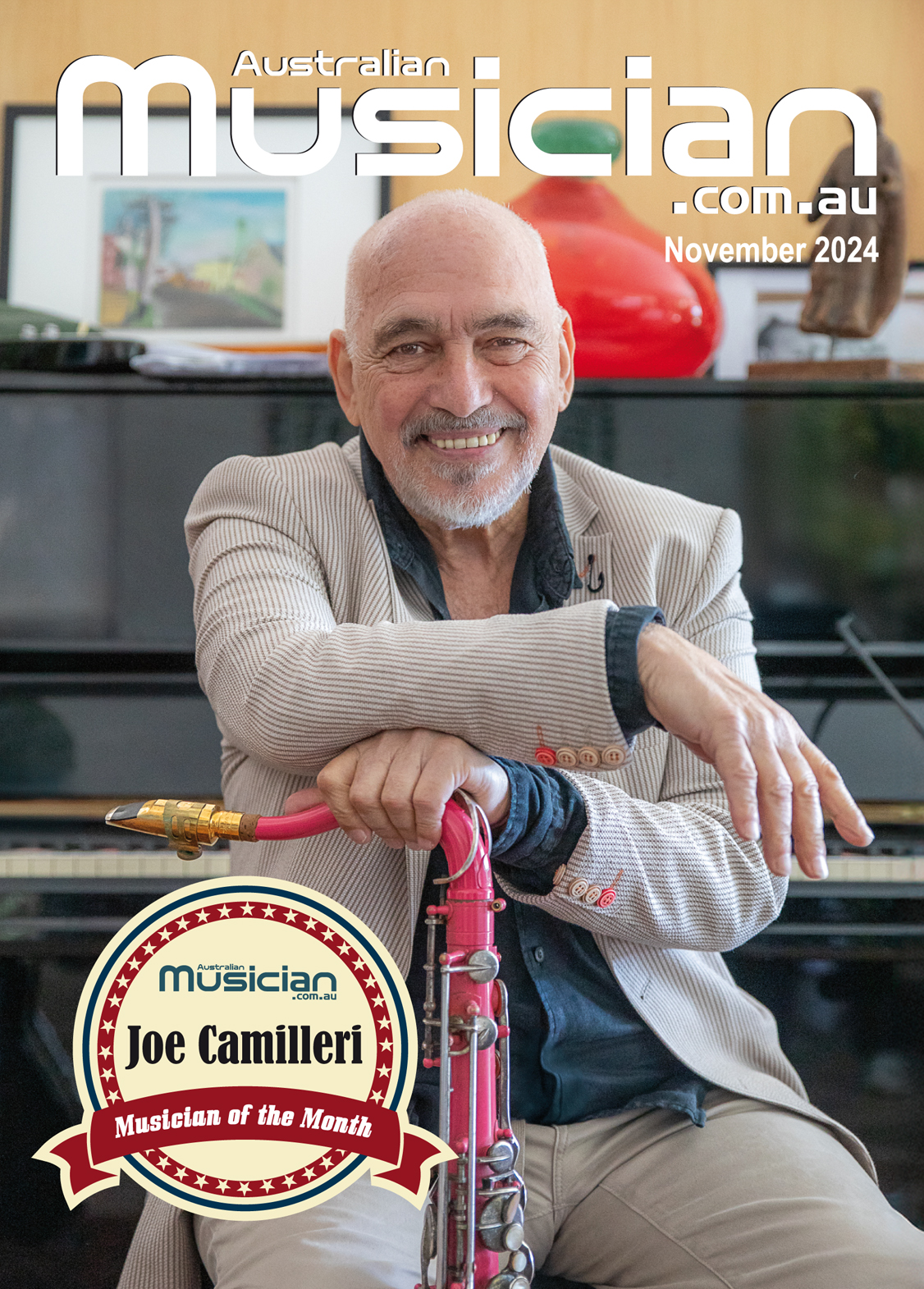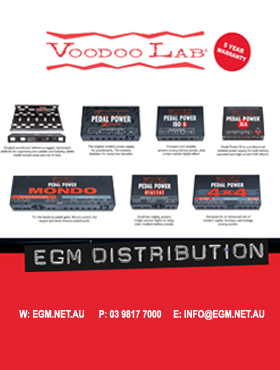LIAM FINN
September 10, 2007 | Author: Greg Phillips
 Amid a haze of white noise at a packed East Brunswick Club, Liam Finn launched into a freefallin’ performance of tracks from his new solo album ‘I’ll Be Lightning’. The flexibility of his one man band ethos (plus a backing vocalist) allowed Finn to utilise his bag of loops and effects to mould the material in plasticine fashion any which way he wanted. If ever Liam was to step outside of father Neil’s immense shadow, then things had to be done this way. Their voices are genetically similar. Their sense of melody has parallels. To create his own musical persona, Liam needed to throw caution to the wind. And with ‘I’ll Be Lightning’ and even more so on stage, that’s exactly what he did. Listening to the album, you’ll occasionally prick your ears at a generic Finn soundbyte, it’s unavoidable. But the manner in which Liam approached the recording of the album was entirely of his own doing. It’s all about sounds and emotions rather than beats and standard structures. At their heart, the songs are quite stark, but dressed in a wardrobe of colourful and creative sonic apparel. Greg Phillips sat down with Liam prior to the album’s release to discuss the essence of the recording.
Amid a haze of white noise at a packed East Brunswick Club, Liam Finn launched into a freefallin’ performance of tracks from his new solo album ‘I’ll Be Lightning’. The flexibility of his one man band ethos (plus a backing vocalist) allowed Finn to utilise his bag of loops and effects to mould the material in plasticine fashion any which way he wanted. If ever Liam was to step outside of father Neil’s immense shadow, then things had to be done this way. Their voices are genetically similar. Their sense of melody has parallels. To create his own musical persona, Liam needed to throw caution to the wind. And with ‘I’ll Be Lightning’ and even more so on stage, that’s exactly what he did. Listening to the album, you’ll occasionally prick your ears at a generic Finn soundbyte, it’s unavoidable. But the manner in which Liam approached the recording of the album was entirely of his own doing. It’s all about sounds and emotions rather than beats and standard structures. At their heart, the songs are quite stark, but dressed in a wardrobe of colourful and creative sonic apparel. Greg Phillips sat down with Liam prior to the album’s release to discuss the essence of the recording.
So what was the grand plan with this album before you started?
I think with this record I was trying to recreate the demo process, where you get that demo-type thing that you can never recapture in the studio… that X factor… the freshness. You know, the first time you put it down and it’s not premeditated. I put myself in the studio with all these great mikes going through a Neve desk onto tape and tried to capture that immediate feeling of the first time you are putting it down. I tried to do all the vocals live with the original take. I think there’s something strange about doing rhythm tracks first then maybe overdubbing guitars and then doing the vocals last. That’s the first thing you hear is the vocals, so I think that’s what you should be basing everything around. I also think when you do live vocals, you tend to play the guitar differently. You tend to sing it differently because you are not just sitting there, you are performing. I think that is lost with Pro Tools and messing around with it.
One thing I picked up with the album is the rhythm section, the bass and drums are well back in the mix with the effects up front. It’s mood driven rather than beat driven …
I think that’s what I wanted to do. In contrast to being in Betchadupa which is a real band, which was really rockin’ and everything was up there in the mix, I wanted to be a bit more experimental with this. I think a bit more like the records in the 60s and 70s where the drums were always a lot further back, whether it be The Beatles or Hendrix or Neil Young, the drums were always back in the mix. Really, it’s the song that you are trying to get across. If the rhythm is the most important part of the song, then yeah sure, but these are more melodic intimate songs that have to be treated that way.
I know a lot of artists toil over when to finish an album, but it seems it happened quite naturally for you?
I think it is important to finish it! (laughs) I mean … not to spend too much time on it because you could spend ten years on a record if you wanted to. It’s a lot of fun and you always have new ideas but the more you develop a song in the studio, you lose the original vision of what the song was about. You lose the fresh ideas that you had and a song shouldn’t be taken that seriously really. It’s either going to be a good song or not. Doesn’t matter what you are going to do to it. It’s good to force yourself to move on then make another record. The best songs will stand out from that record and you’ll play them the rest of your life and the ones that didn’t cut it, you move on.
Let’s talk about some of the sounds on the album. You’ve got some pretty dirty bass sounds, how did you arrive at those?
Some of it is actually a guitar going through an octave pedal. It distorts it when you make it an octave lower. Since I have been doing this one man band live show, I’ve got myself an octave pedal and do my bass lines over these loops and with the sequencers and stuff. When I was in the studio quite often I would be just trying out an idea, and because I’d just done a guitar track, I had all my guitar pedals available. I’d try things out and I’d think, well that has just as much bottom end as a bass. May as well just use that. And it sounded really gnarly. I like interesting sounds and there’s a lot of really bland music out there. Working with producers or engineers who have learnt the traditional way of recording, it’s hard to push them in new ways. They are into experimenting a little but they say… but… but at least we need to get a DI feed just in case. But I hate the ‘just in case’. I reckon you have to commit and make each sound suit the song . Also that’s what adds to the atmosphere of the song and creates that mood. The thing that inspired me musically over the last couple of years was listening to bands that weren’t necessarily like me but a band like TV On The Radio that create these pads of noise with loops and stuff. I guess what is infectious is the mood rather than the actual quality of the sound. That’s why a lot of lo-fi recordings are far more moving than these wonderfully recorded, full spectrum of frequency things. To me that is just not interesting. I think where the holes are, is where the atmosphere is.
The drums are used very sparingly, sometimes just a snare?
Yeh, I guess that’s my demo aesthetic. I love playing drums so it was a treat for me to be able to do it on this album, and I didn’t realise I could do half of the things I could. I think I was just having a ball and it seems that’s what people are responding to. The sound of the album is someone going at it with reckless abandon going ‘let’s try this!’ You know, ‘Let’s distort this, put that through an octave pedal’.
And you’ve mainly used acoustic guitar on the album?
I’ve only just realised that listening to it recently. When I play live, I play with electric so it’s completely different. I used a beautiful old Martin on a couple of tracks. I also used this little guitar that was made for me by a guy named Danny Farrington when I was about seven or eight years old. He was making dad a guitar and he ended up making this miniature one for me for free on the side. Dad ended up using my one more than his. He asked me at seven, what colour I wanted it and I said pink and purple. But it’s a great guitar. I really love small acoustics, so much more character and a chunkier sound. I used a Maton too and there was a big old Gibson acoustic that I wanted to use but my dad took it to England.
And electrics?
I’ve always used a Gibson SG Jnr with Betchadupa and on stage. It’s just my favourite guitar. But with excess baggage while travelling, I had to choose between bringing my pedals back or my guitar. So I took my pedals. I was thinking, ‘I’ve done this record with loops and I’m doing shows’. So I knew there were some guitars back in the studio. So I came back and dad had taken all his stuff, because I love his Gretsch. I love the Bigsby. But he’d sent everything to England. I was left with a whole bunch of Fenders. There was a Telecaster which I love, which I pretty much used on the album. I’ve actually stolen it secretly… this great old 60s Telecaster and a really old Stratocaster. I’ve never been into Stratocasters but this one has wonderful sounds.
Through what kind of amps?
I’ve used this little White amp a bit. A little 15 watt, maybe even 10 watt amp by this American company called White. Similar size to a Pro Junior, which is what I use live. I like small amps at the moment, especially when you mike them up they sound better than the big amps. But there’s an AC 30 on there and a bit of Twin reverb. Quite often I used MIDI strings but I put them through one of those old 80s Roland, solid state things that you’d see in schools. They have this chorus effect on them that is just wild. I think two years ago I wouldn’t have been caught dead using a chorus pedal but this amp has a cool quality to it. And I used it on some lead stuff and strings. The scratchiness almost made it sound like real strings.
Did you use a mandolin on the track ‘Remember When’?
No probably just loops that I used in half time. Then with my loop pedal, you can either make the loop an octave lower and half the speed or octave higher and double speed. I make a lot of my loops really slow and then make them faster and they can sound like a mandolin, or make it go backwards and it sounds like strings. With the reverse effect when you make it an octave lower, it sounds like a harp or piano sometimes. So a lot of the mysterious sounds are quite often just guitar with my loop pedal.
The piano on ‘Shadow Of Your Man’ sounds like it was recorded in a big empty room?
It is yeah. I made the whole record in the control room in the upstairs room of a building that now… the main two floors… are dad’s amazing new studio that he built. Probably the best studio in the Southern hemisphere, but while that was being built I was upstairs where all the gear was being stored. Then this room next to it is this big ballroom with this beautiful, Lipman upright piano and that was that sound. I put a few mikes in different spots around the room.
I imagine you fiddled a bit with miking all sorts of things?
Yeh It was trial and error really. Neil Baldock who was the house engineer taught me the Glynn Johns three mike drum technique (gesturing a triangle shape). He set me up with a kit and three mikes and gave me a few roaming mikes, a few 57s. I pretty much had the whole board with the different mikes. So I was learning as I went and would go OK, I’ll try it with this channel, and within the time I was there formed my own aesthetic I suppose.
Most kids have differences of opinion with their parents about a lot of things, with your dad do you have arguments over the merits of particular bands?
I think we’ve got similar tastes but there are some things I like that he doesn’t really understand and there are things that he likes that I am very dismissive of as well. Being the younger one sometimes dad will come up and say ‘what do you think of this band’? I’ll go’ they are OK’. And he’ll go ‘hmm alright’. I think we have both learnt that I don’t know what’s best for him and he doesn’t know what is best for me, so it’s best just to be supportive. When we can make it work as a collaborative thing, it is great. There is nothing more special than being able to play music with your family.
What does music mean to you?
It’s fun. Its the best buzz in the world. It’s even a therapeutic thing to process your brain. Things happen and it’s hard to process life. You write a song about it and without realising what it’s about, you are processing what’s going on and it makes you deal with things in a better way. But I just enjoy it really. I just feel if I can do this the rest of my life I am blessed.
I’ll Be Lightning is out now on Liberation.
OTHER SONS OF GUNS
The old man:
Tim Buckley
Late 60s, early 70s avant garde, folk, funk, soul, psychedelic American vocalist whose album ‘Greetings from LA’ is posthumously regarded as a classic. Drug related death at age of 28
The kid:
Jeff Buckley
Guitarist, singer-songwriter Jeff Buckley came to prominence in 1994 with the release of his widely acclaimed debut album ‘Grace’. Known for his ethereal voice and heartfelt lyrics, Jeff drowned in the Mississippi river at the age of 30, living just two more years than his father.
The old man:
John Lennon
Beatle. Walrus. Rebel. Political activist. Legend. Gunned down by a psycho outside his New York Apartment in 1980.
The kid:
Julian Lennon
Released 5 albums but found it impossible to sustain a real career in music. Problem? His dad was John Lennon!
The old man:
Bob Dylan
Voice of a generation. American institution. Western civilisation icon. Poet. Legend also.
The kid:
Jakob Dylan
Lead singer and songwriter for credible US rock band The Wallflowers.
The band’s 1996 album Bringing Down the Horse sold over 4 million copies, however they were eventually dumped by their label. Jakob signed a deal with Columbia (just like paw) late last year. The future of The Wallflowers remains uncertain.


